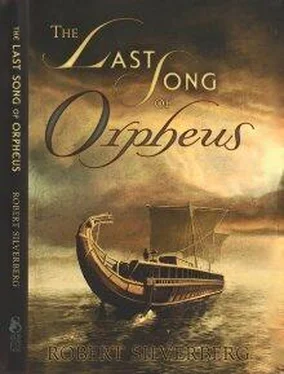And so, Egypt. At Pharaoh’s court I dwelled, and there, under that cloudless sky, beside that broad reeking river, in that land of nightmare gods and many-columned temples as big as cities, I learned the magic of their priests and was initiated into the secrets of their beliefs and slowly, very slowly, began to enclose the running sore that was my great grief within an insulating shell of stone within my heart.
The strangeness of Egypt! How astounded I was by it!
As I have already told you, I was never young, as the world understands the ordinary meaning of that word. I came into the world ten thousand years old, and there is nothing that I can say I have seen for the first time, but, even so, though always I look backward and forward along the river of time, there was much that was new and strange to me in Egypt. Do I seem to contradict myself? Yes, I do; but I embody in myself all the contradictory things that men have believed of me. I confirm nothing; I deny nothing. I am Orpheus the demigod, and you must be a demigod to comprehend what that is like to be. I will help you as much as I can; but it will not be enough.
Egypt, then.
That blazing sun, that all-seeing fiery eye filling the heavens. The scent of unknown spices and the heavy reek of the enormous river. The carvings on the walls, the gods with the heads of hawks and vultures and lions; the snakes with legs; the beetles that spoke. The vast temples that were like forests of stone columns. The people with sly faces, moving busily but silently through the city streets, smiling, covertly staring at one another. Here and there I saw a swarthy bearded man who plainly was of Crete or Mycenae, or one from Babylon, or a little knot of black-skinned folk in robes as bright as the sun, for this was the great cosmopolitan center of the world. No one took notice of me. Why should they? I was cloaked in my grief and it made me invisible.
I went to the stone palace of their king and sang myself past its myriad guards into its airy halls.
Their king is called Pharaoh. So it has been for thousands of years. This Pharaoh was a small slender hawk-faced man, dark as ivory that has spent a century in the sun and almost fleshless, who wore a white cotton wrap around his loins and a lofty double crown, one part of it red and the other white, and a jewelled pendant on his bare breast, a heavy thing of gold and emeralds and rubies, that was so bright it hurt one’s eyes to look upon it. He held a golden scepter in each hand, one that had the shape of a flail and one that had the shape of a crook, and he wore a stiff little false beard strapped to his chin.
“Well?” he said, and I struck a chord on my lyre and sang to him of the lands beyond Egypt that he had never known, king though he was of the mightiest of realms.
I sang to him of Hellas, its great jagged mountains and green plains and cool swift rivers, and of the islands about it in the sea that sparkled in the sunlight like his pendant. I sang of Troy, and of the war that had not happened yet, but would. I sang him Agamemnon and Clytemnestra; I sang him invincible Achilles and valiant Hector; I sang him Helen and Paris and Menelaus; I sang him Heracles and Icarus and Perseus, Theseus and Prometheus and King Oedipus. I sang him Zeus and Apollo and Poseidon and Dionysus. Then I sang to him of the mysterious humid jungles of Africa and the giant predatory beasts that prowl their vine-entangled paths. I sang of the Hyperborean lands that I would visit in a later year, that time when I would sail with Odysseus, those dark water-girt lands, densely forested and green with rain, where the people are as tall as this Pharaoh is short and as fair and golden as he is dusky, and the summer days never end and cold thick snow falls from the bleak gray sky in the wintry time of little light. I sang of the far lands I have seen in dreams, where the yellow-skinned shaven-headed emperors dine with sticks of ivory on vessels of bronze and clothe their daughters in garments of silk. I sang to him of mighty Rome that is yet to come, and of the even mightier empires that will come still farther on in time, in a day when men will fly through the air and journey to other worlds. I even sang to him of those other worlds. I had never sung so long nor so well in all my days. But I was not so much singing for him as I was for myself, for I needed to sing my way into Egypt in order to heal myself of my sorrow, and as I sang I knew I was conquering him and would thus in time conquer even my own intense and nearly unconsolable grief.
He listened without a word, gripping the sides of his golden throne so hard his arms began to tremble. When I stopped he pointed at my lyre with the flail-scepter and said, “What is that thing? How is it made?”
“It is made of a frame and a sounding-board and strings,” I said.
He beckoned with the scepter and I put the lyre in his hands and he swept his fingers across the strings and made an ugly discordant sound.
“No,” I said. “Like this.” I took it from him and sang him the first song of Orpheus and Eurydice, the happy one, the song of meeting and loving, and he began to weep. Great glossy tears ran down his fleshless face and vanished into the coarse bristles of that false beard. He seemed bewildered, as though he had never wept before: I think that was so. For he was a man of stone, if he was a man at all, this Pharaoh of Egypt. He was not accustomed to weeping. He maintained a godlike facade, and I think he believed, much of the time, in the reality of his own divinity, though behind that facade there was, I suppose, a real man, with all the doubts and fears and turmoils that real men have. Only through my music could I reach past the stony facade to the man within.
“Sing another,” he said.
So I sang him the second song of Orpheus and Eurydice, the song of her death, and he wept again, though it was a different sort of weeping and it bewildered him even more. I sang him the song of my finding her. I sang him the song of my losing her again. Then he had had enough; the experience of feeling strong emotion was something new to him, I knew, and my singing brought him pain along with delight.
“You will make such instruments of music for us,” said Pharaoh. “You will teach us the art.”
I pressed my hand to my breast in acknowledgment of the command.
Pharaoh grew fond of me. I became a member of his court, the familiar of his high priests and viziers. Each night when the furious sun dropped into the western desert I sang before his throne, never the same song twice. They all came to hear me. I made them weep; I made them tremble. Music was not unknown to them, but they had not known music like mine.
Proudly Pharaoh showed me his wives, some of whom, he told me, were his sisters. The king here always marries his sisters. Well, Hera is the sister of Zeus, and the Egyptian goddess Isis is the sister of their Osiris; evidently such marriages are essential on the highest levels of the cosmos, and the kings here imitate what the gods do, for they fancy that they are gods themselves. He showed me the royal treasury, overflowing with the spoils of the nations. He allowed me to visit his great library, a lofty stone chamber full of paper scrolls that he said contained all the wisdom of the universe, though he did not allow me to look into them, not just yet. And he took me to see his tomb, which had been in the making for all the twenty years of his reign. A stone chamber, it was, on the far side of the great river that splits his land in two, or rather a whole series of chambers, descending deep into the earth so that he would sleep beyond the reach of the heat of the day when the time for him to sleep arrived. About it were many other such tombs, belonging to the earlier kings of his race.
Читать дальше












